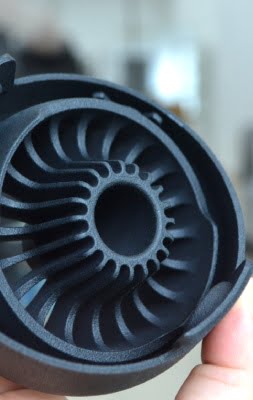Precision microfluidic chips in 3D Printing and Diffusion Bonding
Since 1969, IPFL has stood at the heart of the microfluidics UK landscape, supplying researchers from Cambridge to London with production-ready microfluidic devices and manifolds that satisfy the stringent purity, pressure and optical standards demanded in modern life-science labs. Leveraging ultra-high-resolution PµSL microfluidics 3D printing, micron-accurate CNC machining and solvent-free diffusion bonding, we transform CAD concepts into leak-tight channels below 50 µm that support true laminar flow for lab-on-a-chip, organ-on-a-chip and rapid-analysis cartridges. Our vertically integrated workflow removes tooling bottlenecks, so pharmaceutical scientists exploring drug-formulation microfluidics, bio-engineers perfecting cell-culture microfluidics and diagnostics teams prototyping DNA / RNA amplification chips all gain same-week turnaround and ISO-certified reproducibility.
Working exclusively in medical-grade COC, PMMA, PC, Ultem and other bio-compatible polymers, IPFL delivers everything from single-iteration proofs of concept to pilot-scale batches for dialysis, point-of-care PCR and continuous patient-monitoring systems. Each plastic manifold is fabricated to create optic-grade, dead-volume-free interfaces that withstand sterilisation cycles and aggressive reagents. Engineers searching online for microfluidics fabrication, how to make microfluidics, or a dependable microfluidics company discover that IPFL’s blend of precision manufacturing, rapid fluidics prototyping and regulatory guidance accelerates projects from sketch to clinic—without compromising performance or timeline.


Microfluidic Device Manufacturing at IPFL
IPFL specialises in precision microfluidic device manufacturing for applications in medical diagnostics, drug delivery, fluid analysis, and lab-on-a-chip systems. We use advanced processes like micro 3D printing and diffusion bonding to produce miniature channels and flow paths with extreme accuracy.
Micro 3D Printing for Microfluidics
Our BMF micro 3D printing technology achieves channel sizes below 50 µm with true-to-CAD geometries, ideal for rapid prototyping and complex designs. This high-resolution additive manufacturing allows fast turnaround of functional prototypes without the need for tooling, helping researchers and engineers speed up product development.
Diffusion Bonding & Clear Plastics
For multi-layer microfluidic chips, IPFL offers plastic diffusion bonding of high-clarity materials like acrylic and COC (cyclic olefin copolymer). This creates strong, optically clear, leak-free assemblies without adhesives—perfect for optical sensing, biomedical testing, and fluid control.
Why Choose IPFL for Microfluidics
With over 50 years of experience, IPFL delivers rapid, reliable manufacturing for microfluidics in low to medium volumes. We manage high-value, application-critical parts with precision and care, supporting industries from med-tech and diagnostics to academic research and biotech innovation.










IPFL does more than cut parts; we unlock innovation for the biotechnology and medical-device sectors by pairing in-house R&D support with the fastest microfluidics 3D printing service in the region. From our facilities in and near Cambridge, our engineers convert complex channel networks, mixing spirals and sensor cavities into fully bonded cartridges in days, empowering start-ups and blue-chips across the microfluidics Cambridge cluster to iterate designs swiftly and cost-effectively. Whether you need an optically clear microfluidics chip for fluorescence imaging, a chemically inert manifold for drug-delivery microfluidics, or anatomical guides for surgical rehearsal, our ISO 9001:2015 workflows ensure every component exits our workshops ready for applications.
Step into the next generation of medical and pharmaceutical manufacturing with IPFL’s adaptable and precise services. Reach out to us to explore how our specialized plastic components can contribute to the health and well-being of society.
Our diffusion-bonded assemblies are adhesive-free and pressure-tested, they safeguard delicate cell lines in microfluidics for cellular applications, preserve assay integrity in microfluidics for biological applications, and maintain flow accuracy for prototype projects destined for high-throughput screening. Clients rely on IPFL’s half-century heritage, material expertise and UK-based logistics to shorten the path from idea to impact—proving once again why we are the trusted microfluidics company for manufacturers who refuse to compromise on clarity, strength or speed.